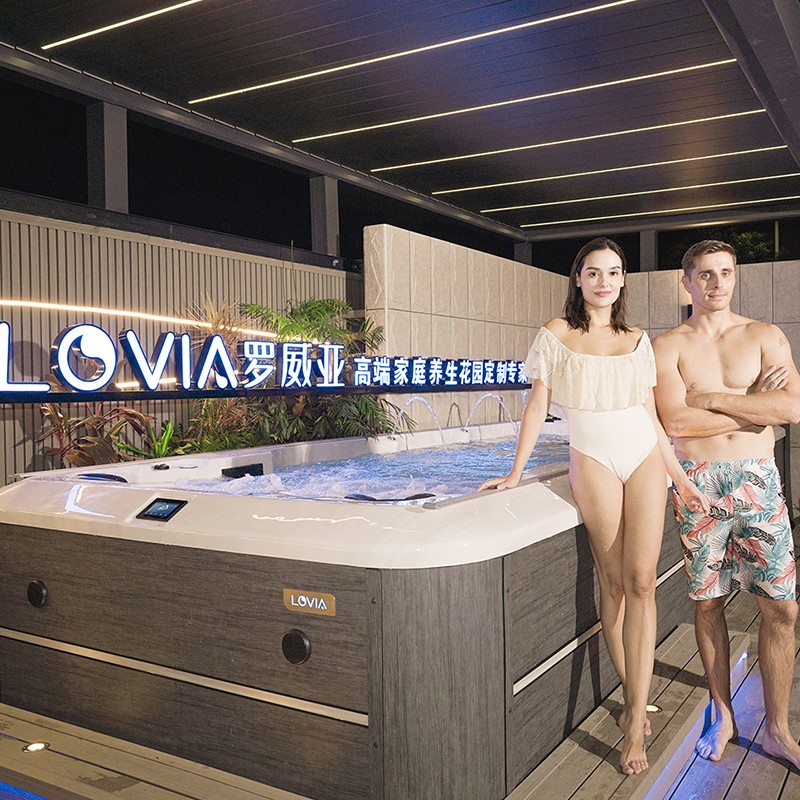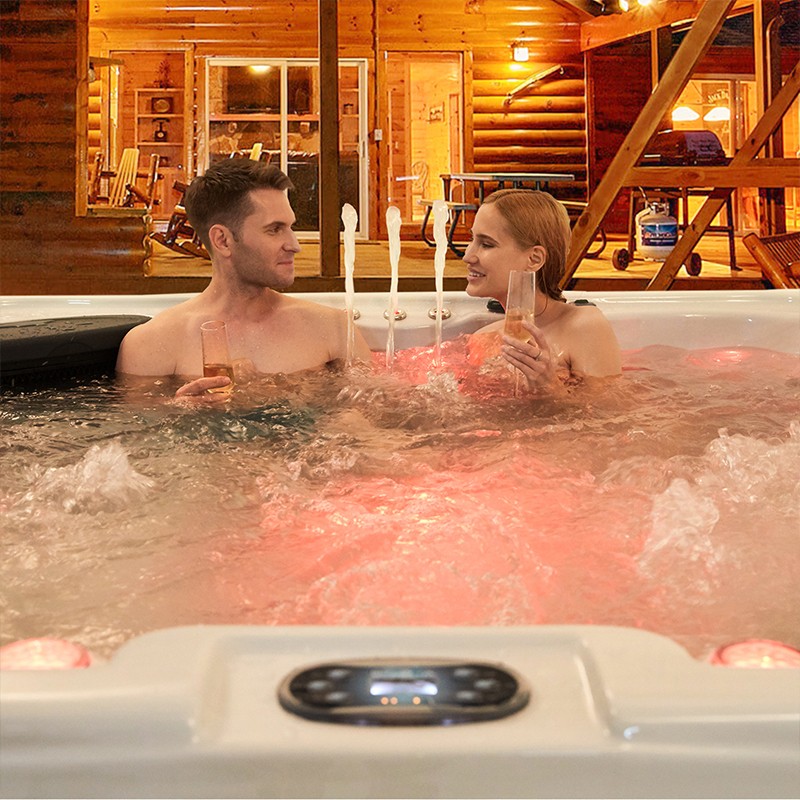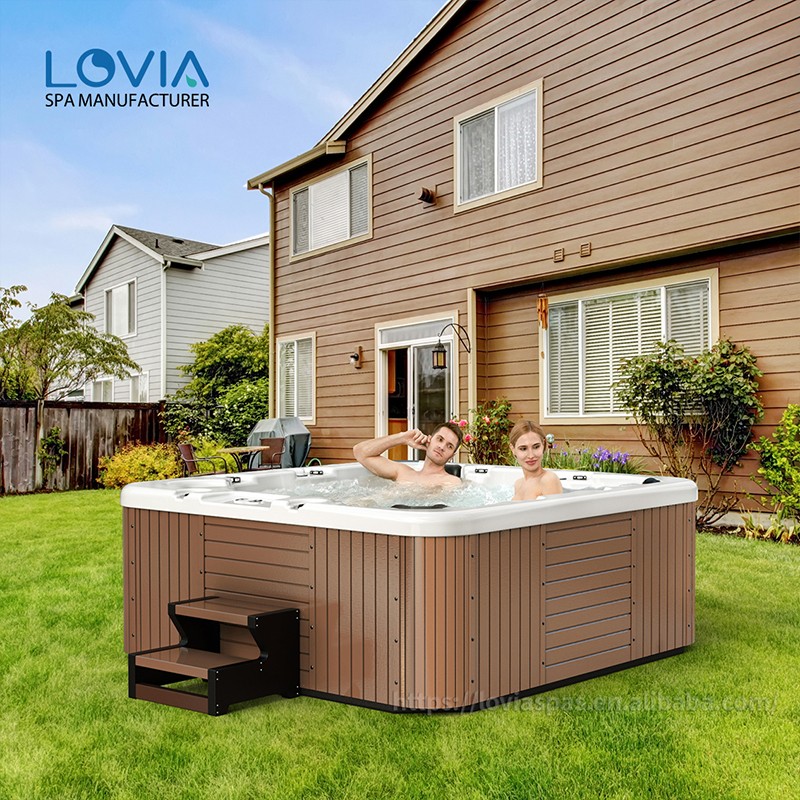
Is an outdoor massage bathtub good for herniated disc?
2024-12-06 15:35Herniated disc is a common spinal disease, especially in people who sit for long periods of time, lack exercise, and have poor posture. It can cause pain and discomfort in the back, neck, and even legs, and in severe cases may affect the quality of daily life. With the popularity of outdoor massage bathtubs, many people have begun to pay attention to its potential efficacy in treating herniated disc.
So, is an outdoor massage bathtub really good for herniated disc? In order to fully explore this issue, this article will analyze the working principle of the massage bathtub, the physiological effects of warm water therapy, the pathogenesis of herniated disc, and the relevance of scientific research, aiming to provide an in-depth reference for patients with herniated disc.

What is herniated disc?
Herniated disc refers to the intervertebral disc in the spine that is degenerated or externally acted upon, causing the annulus fibrosus to rupture, resulting in the nucleus pulposus protruding outward, compressing the adjacent nerve roots, and causing a series of symptoms such as pain, numbness, and muscle weakness. Herniated discs often occur in the lumbar and cervical spine, especially in the lumbar L4-L5 and L5-S1.
The intervertebral disc is essentially a soft tissue that acts as a cushion between the vertebrae, helping the spine to withstand pressure and maintain flexibility. However, as we age, the intervertebral discs gradually degenerate and become more fragile. Some poor posture, excessive exercise or external impact can cause excessive pressure on the intervertebral discs, eventually leading to herniation or rupture.
How does an outdoor massage bathtub work?
An outdoor massage bathtub is a device that combines warm water and water flow massage functions, designed to provide deep relaxation and relieve muscle pain. It works mainly in two parts: warm water therapy and water flow massage. The combination of the two can produce significant analgesic and relaxing effects, especially suitable for muscle and joint pain relief.
Warm water therapy:
Hydrotherapy promotes blood circulation and relaxes muscles and joints by immersing the body in warm water. The temperature of warm water is usually between 36°C and 40°C, and this temperature range has a mild calming effect on the human muscles, joints and nervous system. When the body is immersed in warm water, muscles relax, blood vessels dilate, and blood flow to injured or inflamed areas is increased, thereby reducing pain and stiffness.
Water massage:
Outdoor whirlpool bathtubs are usually equipped with multiple water jets, and the pressure of the water can be adjusted to provide massage effects of different intensities. These water jets can be targeted to specific parts of the body to help relieve muscle tension, reduce fatigue, and even promote the body's natural healing process. Massage water streams indirectly promote nerve relaxation by stimulating the skin and superficial tissues, helping to relieve muscle spasms caused by pain.

What are the main symptoms and care needs of patients with herniated discs?
The symptoms of herniated discs vary depending on the severity of the patient's condition and the location of the herniation, but they mainly include the following aspects:
Pain:
The most common symptom of intervertebral disc herniation is pain in the waist or neck, and sometimes the pain radiates to the legs or arms, especially when the nucleus pulposus compresses the nerve roots, the pain will be aggravated. The pain is usually aggravated when standing, walking or sitting incorrectly.
Numbness and tingling:
Nerve root compression can cause local numbness and tingling, which usually spreads along the nerve distribution area. For example, lumbar disc herniation often causes numbness in the legs.
Muscle weakness:
Disc herniation can also cause muscle weakness in the area innervated by the compressed nerve. Patients may feel weakened in their limbs, which affects daily activities.
Limited movement:
Many patients feel limited in movement due to pain and numbness, especially when bending, standing, and turning the body.
For the symptoms of disc herniation, patients need a care method that can relieve pain, promote blood circulation, relax muscles and reduce nerve compression. This is why many people think that outdoor whirlpool bathtubs may have some benefits for patients with disc herniation.
What are the potential benefits of warm water therapy for disc herniation?
Warm water therapy is the core component of outdoor whirlpools. Its physiological effect on the human body is to use hot water to act on the skin and deep tissues, thereby producing a systemic relaxation effect. Warm water therapy has several potential benefits for patients with herniated discs:
Relieve muscle tension:
A herniated disc is often accompanied by excessive tension in the surrounding muscles, especially when the muscles contract as a protective response during a painful episode. Warm water therapy can relax these tense muscles and reduce the occurrence of muscle spasms, thereby relieving pain. The buoyancy of the water can also reduce the pressure of the body weight on the spine, allowing patients to feel more comfortable and relaxed in the water.
Improves blood circulation:
Warm water helps dilate blood vessels and enhances blood circulation, which is essential for the repair of injured tissue. Good blood circulation can bring more oxygen and nutrients, helping compressed nerves and surrounding tissues recover faster. In addition, warm water can speed up the discharge of metabolic waste and reduce inflammation and pain.
Relieve nerve compression:
When a disc herniates, the nucleus pulposus at the protruding site compresses the nerve roots, causing pain and neurological symptoms. The calming effect of warm water can relieve excessive nerve excitement and reduce nerve irritation, thereby relieving radiating pain. In addition, the buoyancy of warm water can reduce pressure on the spine, thereby temporarily relieving the symptoms of nerve compression.
Relieve psychological stress:
Long-term pain and discomfort often cause psychological stress in patients, and may even lead to symptoms of anxiety and depression. When warm water therapy and massage are used together, it can not only relieve physical pain, but also improve psychological state through the effect of full body relaxation, help patients reduce stress and restore physical and mental balance.

What are the potential benefits of water flow massage for herniated disc?
In addition to the effect of warm water, the water flow massage function of outdoor massage bathtubs can also help relieve the symptoms of herniated disc. Water flow massage mainly acts on the skin, muscles and deep tissues through mechanical stimulation. The specific effects include the following:
Relax deep muscles:
A herniated disc often causes tension in deep muscles, which are difficult to relax through general massage or physical therapy. Water flow massage can stimulate deep tissues through strong water flow, relax tight muscles, and relieve muscle stiffness and pain caused by herniated disc.
Relieve pressure points:
The water jets of outdoor massage bathtubs can usually focus on specific parts of the body to relieve pressure points in the waist, neck or shoulders. For patients with herniated discs, water massage can effectively act on the painful area and help relieve local pain caused by nerve compression.
Promote metabolism:
Water massage can stimulate blood and lymphatic circulation and accelerate metabolism. This has a positive effect on helping the body eliminate inflammatory factors and waste, and helps to reduce the inflammatory response caused by herniated discs.

Precautions and potential risks of using outdoor massage bathtubs
Although outdoor massage bathtubs may have a certain effect in relieving the symptoms of herniated discs, the following points should be noted when using them to avoid causing discomfort or worsening the condition:
Control water temperature:
Excessive water temperature may stimulate the nervous system and cause increased pain, especially for patients with herniated discs who already have nerve compression. It is recommended to control the water temperature between 36°C and 38°C. Avoid high water temperature causing blood pressure fluctuations or other adverse reactions.
Avoid excessive massage:
Although water massage can relax muscles, excessive massage may put a burden on the spine, especially in the acute stage or when symptoms are severe. Patients are advised to control the intensity of the water flow and avoid long-term high-intensity water massage.
Reasonable use time:
Each soaking time should not be too long, usually recommended to be controlled between 15 and 30 minutes. Soaking for too long may cause dry skin or drop in blood pressure, which is more important for weak or elderly patients.
Join hands with Guangzhou HuanTong Industrial for customized outdoor spa solutions that meet your budget and quality requirements. As a top-ranked factory supplier, we provide low-price, high-quality products with wholesale purchasing options and global delivery.
